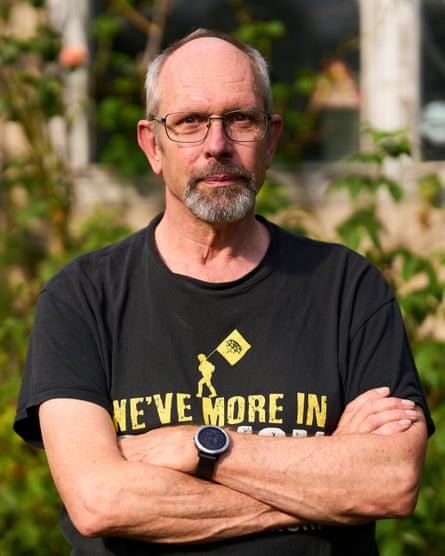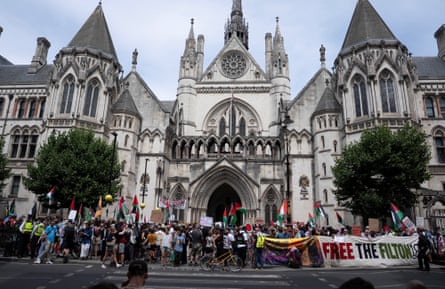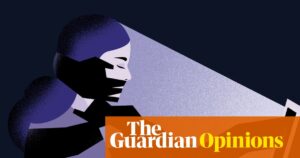At 81, Deborah Hinton, a former British magistrate who was honoured by the late Queen Elizabeth II for services to the community, seems an unlikely terrorist suspect. In the quiet town in south-west England where she lives, much of her retirement is spent walking along the cliffs, raising funds for the nearby cathedral choir, and supporting local charities.
But last month she was detained in a police cell for seven hours, fingerprinted and had a DNA swab taken from her mouth. It was the first time she had ever been arrested, and the experience left her “in a state of trauma” and “shaking uncontrollably”. She could face a jail sentence of six months under UK terrorism legislation.
Hinton is among more than 200 Britons who have been arrested in recent months for peacefully protesting about the war in Gaza and the designation by the British government of an activist group, Palestine Action, as a terrorist organisation. They say the ban is a draconian clampdown on freedom of expression, and runs counter to a proud tradition of protest and civil disobedience in the UK that includes the suffragettes’ campaign a century ago for women’s right to vote and marches against nuclear weapons in the 1950s.
Those detained by police in recent months include Jon Farley, a retired school principal who was silently holding a cartoon from a satirical magazine; Marianne Sorrell, another former teacher now aged 80, who was held by police for almost 27 hours and had her home searched; and the Rev Sue Parfitt, an 83-year-old retired priest, who was arrested while sitting in a camping chair outside the British parliament in London holding a sign stating her support for Palestine Action.
They have become symbols of a growing defiance of the British state’s decision to proscribe Palestine Action as a terrorist organisation, putting it on a par with Islamic State and al-Qaida. Anyone supporting the group, raising funds for it, “glorifying its activities” or sharing its social media posts is committing a criminal offence. Membership of, or inviting support for Palestine Action, carries a maximum sentence of 14 years in prison.
Parliament approved the designation of Palestine Action as a terrorist organisation last month after a series of events. Last summer, activists from the group allegedly targeted Horizon, a British subsidiary of the Israeli defence company Elbit Systems. Five people appeared in court in July, charged with aggravated burglary, criminal damage and violent disorder. The UK’s public prosecution agency argued that “these offences have a terrorist connection”.
In March this year, Palestine Action supporters allegedly vandalised a golf resort in Turnberry, Scotland, owned by Donald Trump, by painting pro-Palestinian messages and digging up part of the course. On his social media channel, the US president referred to the perpetrators as “terrorists”, adding “hopefully [they] will be treated harshly”.
The situation came to a head in June, when activists from the group allegedly caused £7m ($9.5m) of damage to two Royal Air Force planes at a UK military base, using red paint and crowbars, in a major security breach. Palestine Action later released video footage of the action and said the UK was “an active participant in the Gaza genocide and war crimes across the Middle East”.
Yvette Cooper, the senior government minister in charge of national security, argued that the group’s actions had put the country’s security at risk, and that the “serious damage” it had caused to property meant it met the legal definition of terrorism.
There has been resistance to the move, however – a defiance that will be vividly displayed on Saturday when at least 500 people are expected to join a “lift the ban” protest in Westminster, the heart of the British political establishment, at which they will silently hold placards proclaiming: “I oppose genocide, I support Palestine Action.” London’s Metropolitan police, the UK’s biggest force, has said anyone showing support for the group “can expect to be arrested”.
The protest will take place as public opinion in Britain, as elsewhere, on the war in Gaza has significantly shifted over recent months amid horror and revulsion at images of starving Palestinian children and reports of adults and youngsters being shot or blown up as they desperately try to secure food and drinkable water for themselves and their families.
“How has the government got itself into this mess … over people peacefully expressing their opinions?” said Tim Crosland, a former UK government lawyer turned activist and a co-founder of Defend Our Juries, which has organised Saturday’s protest. The event would see “Britain’s backbone on display”, he said at a press conference on Wednesday.
Cooper was at pains this week to say that proscription was decided based on strong security advice. “It also follows disturbing information referencing planning for further attacks, the details of which cannot yet be publicly reported due to ongoing legal proceedings,” she said.
“Those who seek to support this group may yet not know the true nature of the organisation. But people should be under no illusion – this is not a peaceful or non-violent protest group.”
She added that the ban “only applies to the specific and narrow organisation, Palestine Action” and did not affect the freedom to protest about Palestinian rights.
Even so, it has become a flashpoint, with the prohibition of Palestine Action as a terrorist organisation criticised by the UN’s human rights chief, Volker Türk, who said it was at odds with international human rights law; Amnesty International; more than 300 prominent Jews in the UK, who described it as “illegitimate and unethical”; and dozens of global scholars including Naomi Klein and Angela Davis who applauded a “growing campaign of collective defiance” against the ban.
Palestine Action has sought to overturn the ban in the UK courts, and a challenge will be heard in November. The group will be represented by Gareth Pierce, a veteran human rights lawyer with a record of repeatedly taking on the British state – and often winning – over a career spanning more than half a century.
The group’s supporters have said that, according to their legal advice, if the ban is overturned, those detained by the police will be able to sue for wrongful arrest. The 200-plus arrested so far are likely to be joined by hundreds more during this weekend’s protest.
The organisers of the protest have been accused of “plotting” to overwhelm the police and court system. A spokesperson for the Metropolitan police said: “We are aware that the organisers of Saturday’s planned protest are encouraging hundreds of people to turn out with the intention of placing a strain on the police and the wider criminal justice system.”
Palestine Action’s supporters deny the claim but acknowledge that “it will be a challenge to arrest more than 500 people given that we think there are about 520 available police cells in London at any one time”.
One of those planning to take part is Alice Clack, a senior obstetrician and gynaecologist in the National Health Service, and a volunteer with Doctors Without Borders and climate activist. She was arrested in July for holding a sign supporting Palestine Action outside parliament and may face prosecution under anti-terrorism laws.
This week, she said her grandfather’s experience of being brought as a child refugee to England from Nazi Europe on the Kindertransport “taught me the necessity of standing up against injustice”. The labelling of Palestine Action as a terrorist organisation was a “gross abuse of state power”, she added.
Only 10 of the 221 people – many of them senior citizens – that have been detained by police in the past five weeks have been charged with any offence, according to a statement from counter-terrorism police. Several decades after she stepped down as a magistrate, Hinton has been left not knowing whether she will return to court, this time to sit in the dock instead of on the bench.
But her mood of defiance is undimmed. “The rights to demonstrate and other rights are being eroded systematically by the government,” she told the Observer. “We are on a slippery slope to all demonstrations being banned.”











